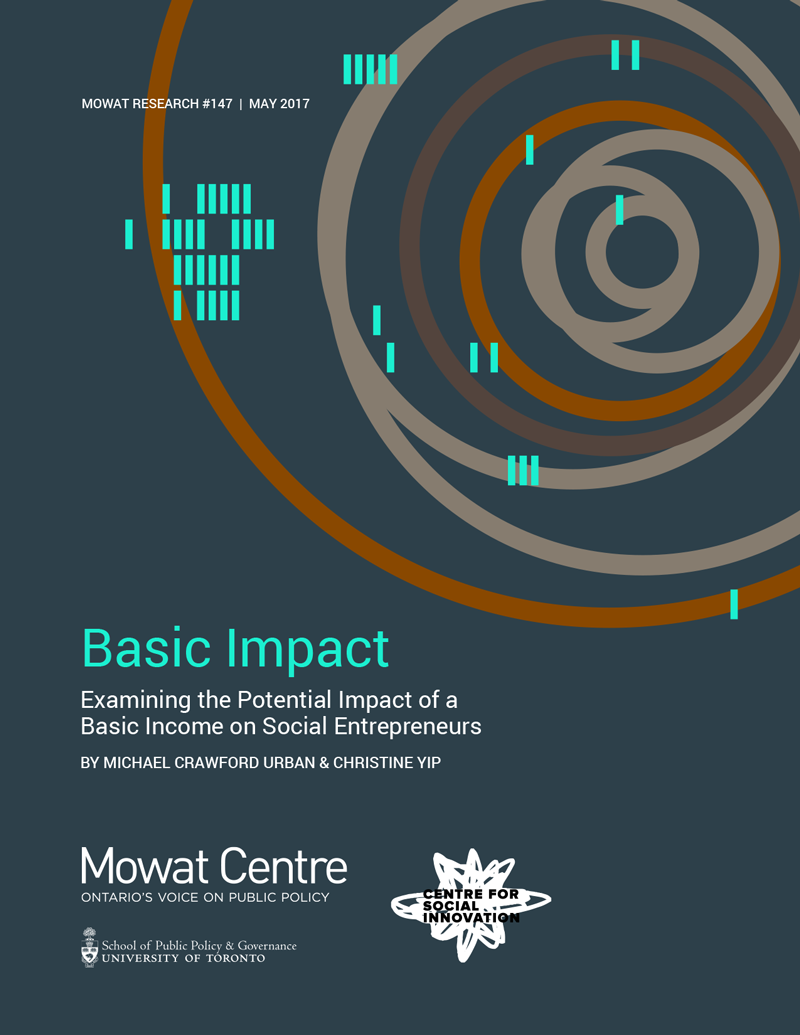May 25, 2017
Examining the potential impact of a basic income on social entrepreneurs
In this report, we examine the potential impact of a basic income on social entrepreneurship. The paper presents the results of a new survey administered to 1,473 members of Toronto’s Centre for Social Innovation (CSI) as well as a focus group and several individual case study interviews.
Through an analysis of the findings of this primary research, combined with a review of the previously separate literatures concerned with basic income and social entrepreneurship, we develop a three-part framework for understanding how a basic income might impact social entrepreneurship and a set of hypothesis about how this impact might materialize. Through this analysis we also identify a number of potential implications of a basic income for the social mission ecosystem that policymakers and stakeholders ought to keep in mind, as well as a set of steps that ought to be taken to further advance discussion of this topic.
This report is part of a series of papers prepared under the auspices of the Northern Policy Institute’s (NPI) Basic Income Guarantee (BIG) project. An earlier version of this paper was presented at NPI’s BIG conference held in Sudbury, Ontario in October 2016. Links to videos, presentations and input from participants attending the conference can be found here.
Executive Summary
The purpose of this report is to explore the potential impact of a basic income on social entrepreneurship. It builds on recent discussions concerned with how a basic income could stimulate more innovation and entrepreneurship, but restricts its focus to the more specific question of what the potential impact of a basic income on social innovation and social entrepreneurship might be. In so doing, it brings together two important ideas whose proponents share similar sets of objectives and whose combination could potentially yield transformative social and economic results.
The report draws on data collected through a collaborative research project conducted by the Centre for Social Innovation (CSI) and the Mowat Centre in 2016. Through an online survey of CSI’s membership, supplemented with a focus group session and individual case study interviews, the Mowat Centre sought to gain a more detailed understanding from some of those on the “front lines” of social entrepreneurship in Toronto regarding how they may be affected, positively and negatively, by a basic income. While a research design of this nature does limit the generalizability of our findings, the in-depth focus it enabled has yielded a qualitatively rich set of data that simultaneously offers important insights for the basic income discussion and provides a foundation for the generation of hypotheses and further research.
Specifically, the results of the online survey yielded a more nuanced picture of social entrepreneurship than is often described. While social entrepreneurship is certainly a field often characterized by altruistic sacrifice, many respondents reported satisfaction with their careers, were reasonably well-remunerated, and possessed strong family support systems. For a minority of low income social entrepreneurs, however, the situation is quite different. For example, in addition to facing greater financial insecurity, these individuals spend more time on work outside of their primary social mission work and are more likely to be dissatisfied with the limited hours they are able to spend on their social projects. This and other similar findings suggest that a lack of resources can create important barriers to entry and growth in social entrepreneurship for lower income individuals.
Continue Reading
Specifically, we see a basic income potentially:
- Reducing barriers to entry into social entrepreneurship, thereby helping create a more diverse and representative social entrepreneurship community.
- Enabling social entrepreneurs to build their organizations and their own capacities by adding to and improving their skill sets.
- Helping to protect social entrepreneurs against illness and provide the psychological space required for social innovation to occur by reducing individuals’ financial stress and anxiety.
In addition to the positive impacts, this report also highlights some potential risks a basic income might pose for social entrepreneurs, such as increased pressure on existing support structures. The report points to the important role that this ecosystem, and the intermediary and affiliated organizations that populate it, can play in mitigating these risks. It also points out that while increased investment, funding, and capacity-building opportunities are important, improving the ways we measure social and economic impact will also be important to realizing the potential benefits of a basic income, should one be implemented.
This report contributes to an important conversation focused on basic income that is currently occurring in Ontario and elsewhere as governments are considering, developing and launching basic income pilot projects. The findings and analysis of this report highlight several important connections between the objectives of a basic income and the work that social entrepreneurs are already doing. In particular, they illuminate a potential “multiplier effect” whereby a basic income would not only directly improve the lives of the social entrepreneurs receiving it, but could also generate important second-order benefits by increasing the social impact of their initiatives. In other words, a basic income offers the possibility of not only directly benefitting recipients, but also of supporting additional activity that could contribute significantly to the advancement of governments’ wider social policy objectives.
These various points of possible intersection and potential connections serve to underline the importance of coming to a better understanding of how a basic income could influence the livelihoods and successes of social entrepreneurs. They also highlight the importance of incorporating social entrepreneurs and their work more fully into the basic income conversation.
Authors
Michael Crawford Urban
Christine Yip
Release Date
May 2017
ISBN
978-1-77259-043-2
Mowat Research
No. 148








